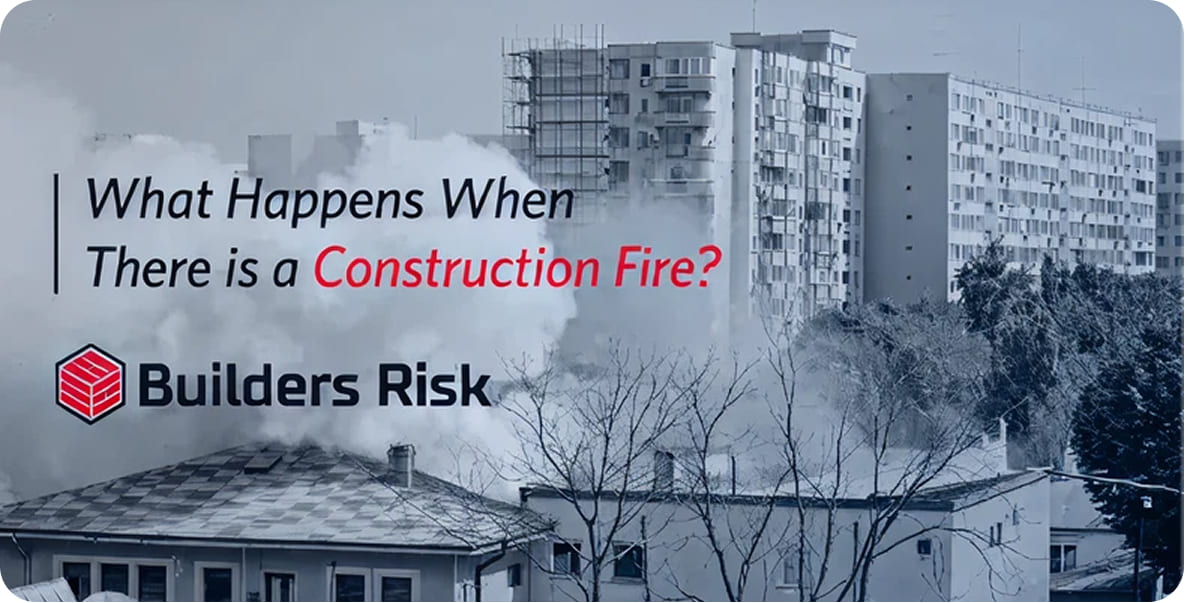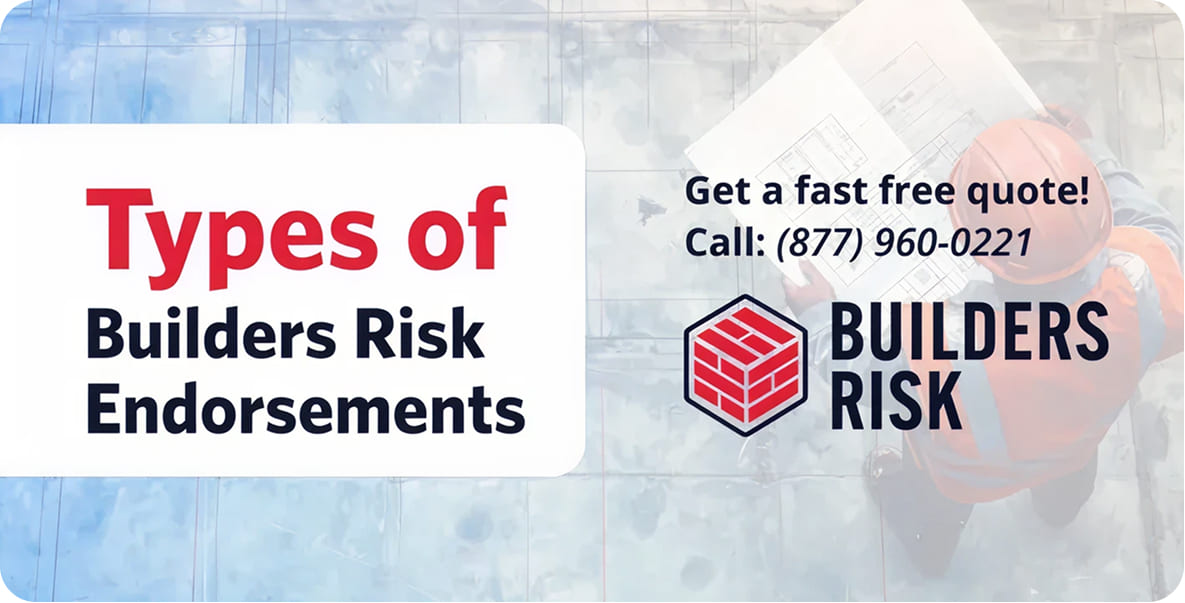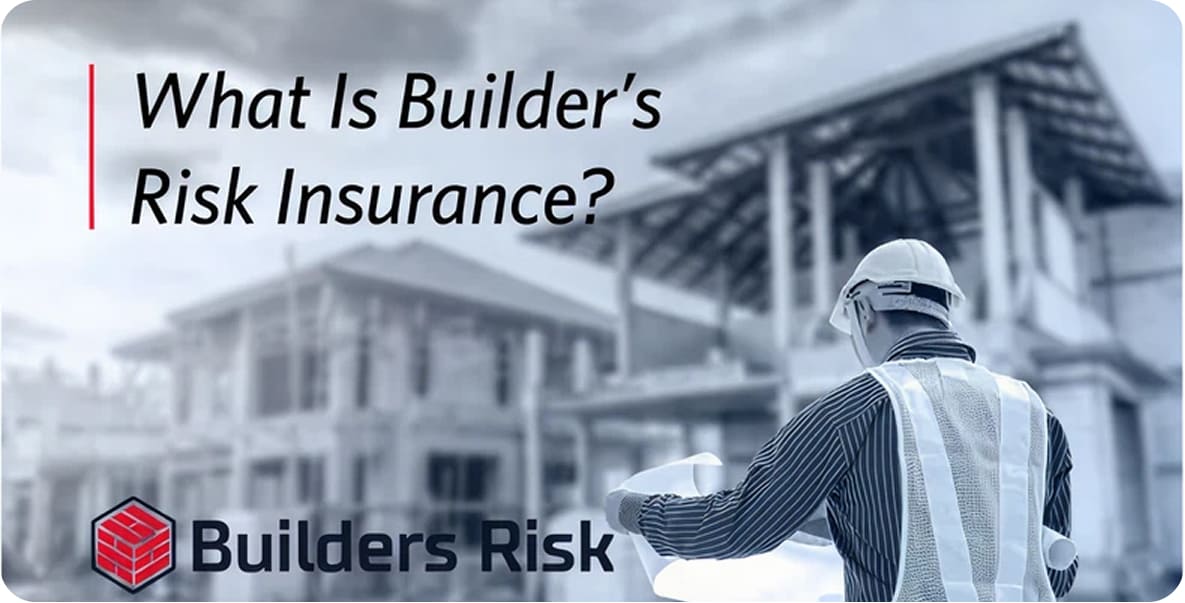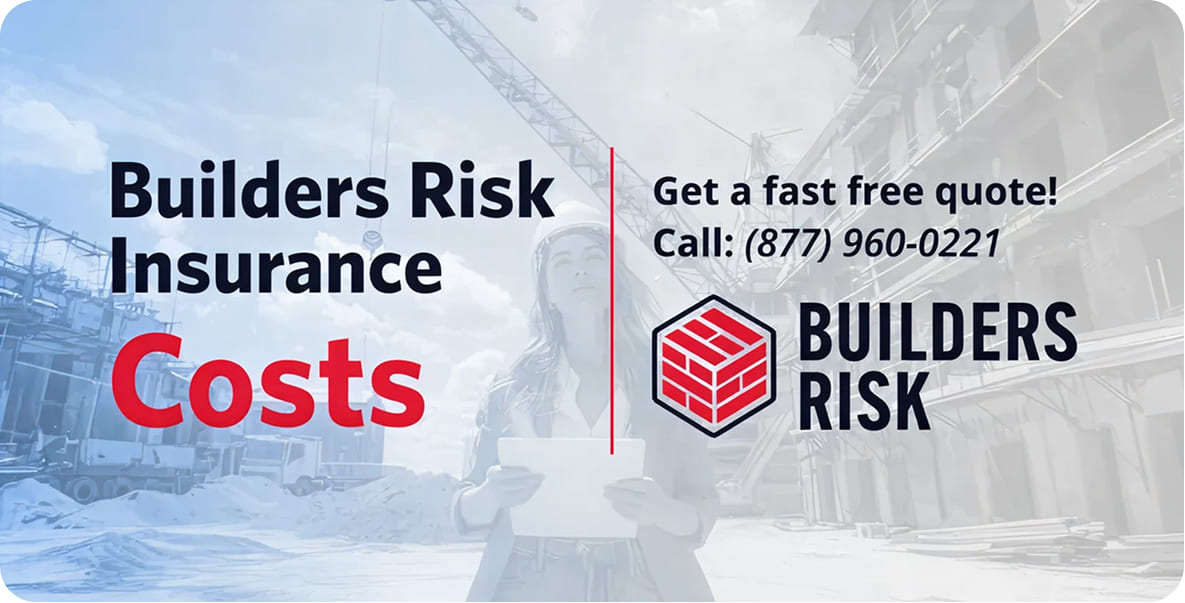Fires in the United States are an unfortunately common occurrence, with an average of over eight civilian deaths daily. Fires can spread rapidly and cause extensive property damage to any structure.
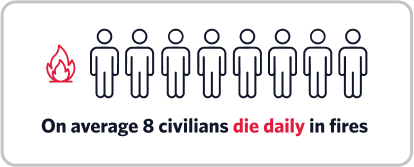
There are nearly 3,500 construction fires each year on properties under construction. While a construction site fire is still rare, you need to know what to do if a fire breaks out on one of your construction projects.
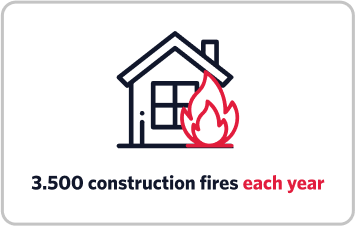
In this article, we will talk about what you need to do in the event of a fire, how to prevent construction site fires, and what insurance coverage help minimize the damage to your business when there’s a fire.
Chances of a Construction Fire
Construction sites are inherently dangerous places. The environment is changing each day, causing a substantial risk of a fire. Buildings are being assembled, often with combustible materials, and many workers are moving around, using power tools and other equipment.
The risk of a fire breaking out on a construction site is significant. In fact, construction fires account for a substantial portion of the total number of fires each year.
The most common causes of construction fires are sparks from welding equipment, electrical shorts, and smoking. However, any fire on a construction site can cause significant damage.
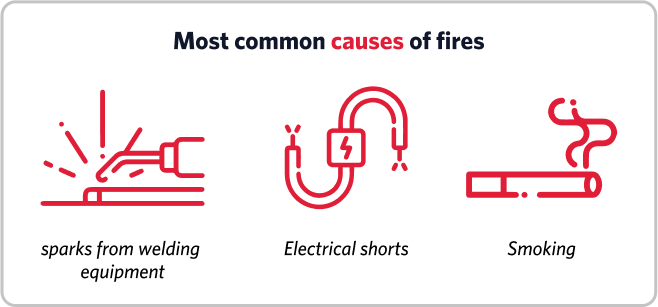
In addition to the risk of the fire itself, there is also the risk of collapse if the structure is not supported correctly. As a result, construction companies need to take steps to minimize the risk of a fire breaking out on their site.
Some simple measures that can be taken include ensuring that all workers are trained in fire safety and installing smoke detectors throughout the site. While not all fire risks can be eliminated, fire prevention is crucial to controlling your liability. Large projects should designate one person as the fire prevention program manager to ensure that someone monitors fire risks at all times.
There is the risk of a construction fire at any construction site, including a major renovation to an existing structure or a significant construction alteration and demolition project.
What Are the Most Common Fire Risks on Construction Sites?
Construction sites are inherently dangerous places. There are many potential fire risks, from flammable materials to electrical hazards. The most common fire risks on construction projects include:

Flammable liquids and gases.
Construction sites often use flammable liquids and gases, such as petrol and propane. These materials can easily ignite, leading to devastating flames. There are many combustible materials used during construction, including flammable gas.

Electrical hazards
Exposed electrical wiring is a significant fire risk on construction sites. If the wiring is not adequately protected, it can quickly come into contact with other combustible materials and start a fire. Temporary electrical service lighting can also be a potential igniter.

Hot Work
Hot work, such as welding and grinding, can also cause construction site fires. If hot work is not supervised correctly, it can easily lead to sparks and flames igniting nearby flammable materials. Two fire pails should be nearby whenever hot work is performed to minimize fire damage caused by an errant spark.

Smoking
Smoking is another significant fire risk on construction sites. Cigarettes can easily ignite dry grass or straw (or other combustible materials), and fires caused by smoking are often hard to control due to the size of construction sites.

Employees
The break area of a construction site can also be a source of fire hazards. If employees use cooking equipment (such as hot plates) or temporary heaters in the break area, it’s possible they could be potential fire hazards. Allowed devices should be outlined in the company’s safety procedures.
How Many Fire Extinguishers are Required?
One of the essential safety measures in any building is having an appropriate number of fire extinguishers. Having readily accessible fire protection systems can minimize the damage caused by a fire. The number of fire extinguishers required depends on the size and layout of the building, as well as the level of risk.
Each state has its own regulations for the number of portable fire extinguishers that need to be on a construction site. Everyone working on the construction project should know the location of the nearest fire extinguisher and other firefighting equipment, and everyone should know how to operate the equipment properly.
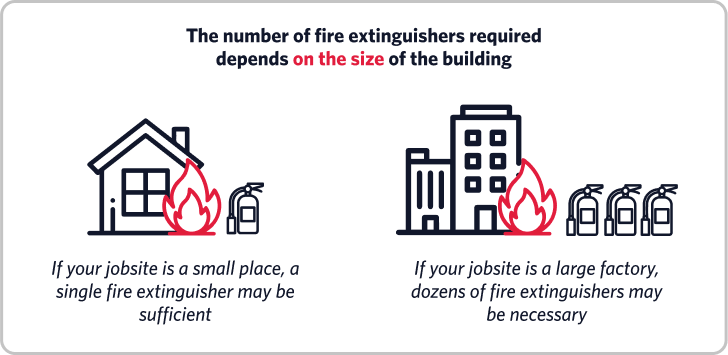
A single fire extinguisher may be sufficient for a low-risk small office building. However, for a large factory with high risk, dozens or even hundreds may be necessary. It is best to err on caution and have more fire extinguishers than you think you need. That way, you can be sure that there will always be one within reach in the event of a fire.
Large construction sites should also have a water supply on-site with hose lines that can be used in a large fire. The construction site’s fire protection program should ensure that adequate water (with sufficient volume) is available in water tank trucks (or a permanent water supply) and that the minimum hose stream range is enough for the entire project. This is only necessary until the building’s sprinkler systems are installed.
What is Fire Stopping in Construction?
Fire stopping is an essential part of construction. It helps to create a barrier between different parts of the building, preventing fire spread.
Fire stopping can be achieved through fire-resistant materials, such as concrete, brick, or metal. These materials are often used to create fire walls, which can help to contain a fire and prevent it from spreading. In addition to material choices, how a construction project is designed can also impact fire safety.
For example, many modern buildings have been designed with fire stops in mind, incorporating them into the overall structure of the building. This can help to provide an additional layer of protection in the event of a fire.
Adequately installed fire doors will have automatic closing devices that minimize property damage spreading to other parts of the job site.
Why Are Buildings Under Construction More Susceptible to Fire Spread?
Any building is at risk of fire, but those under construction are more susceptible for various reasons. For one thing, there are usually more flammable materials on hand, such as sawdust, wood, and paper. In addition, construction work often generates heat, leading to ignition sources like welding sparks. Additionally, combustible liquids and combustible materials accumulate together on construction projects.
During demolition operations, a large number of materials may be mixed.
Furthermore, the usual fire safety measures are often not in place during construction. As a result, a fire that starts in a building under construction can quickly spread and cause extensive damage.
That’s why it’s so crucial for builders to take extra precautions to prevent fires and ensure that everyone on the site knows what to do in an emergency. The fire prevention program manager should have complete instructions for handling a fire that breaks out at the construction site. The fire protection team should also make sure that the operation is regularly inspected to ensure that they are safeguarding construction and following all the applicable construction site safety procedures.
How to Protect Your Business
As a construction business owner, you always look for ways to reduce risk and protect your business from liability. Having adequate fire prevention can protect you and your company from the financial risk associated with construction site fires. The best way to avoid losses from a construction fire is to prevent fires. Still, since you can’t avoid the risk to your job sites entirely, the next best thing is to minimize the risk of fire losses in your construction area.
According to the National Fire Protection Association, fires in commercial and industrial properties cause billions of dollars in damage yearly. In addition, fires can also result in injuries or even fatalities.
You can take steps to protect your business from fire risk. First, ensure your buildings are up to code and have the proper fire safety measures. That includes having working smoke detectors, sprinkler systems, and a fire alarm that alert the local fire departments. You should also develop a fire safety plan and drill your employees.
How To Protect Your Business From Fire
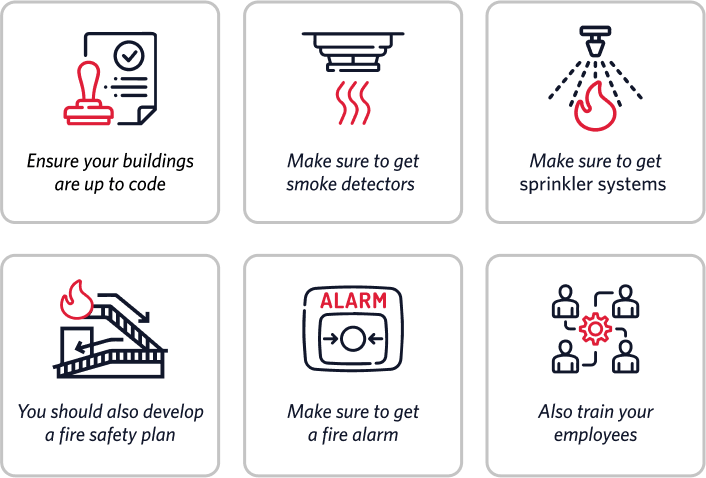
By taking these precautions, you will be working towards minimizing fire losses associated with a construction site fire, being proactive in safeguarding construction projects, and protecting your business from liability.
Advantages of Getting an Independent Insurance Agent
One of the main advantages of working with an independent insurance agent is that they can help assess your risk. They will get to know you and your business and understand your unique needs. That allows them to find the right insurance policy for you, and it also allows them to negotiate with insurers on your behalf.
Independent agents can help you work within your budget. They can get you a cheap quote that will still provide essential coverage for your business.

In addition, independent agents are not beholden to only one company, so they can always offer you unbiased advice. Finally, independent agents typically have a vast network of contacts and usually find the most competitive rates.
The professional agents at Builders Risk have been helping construction contractors obtain policies for years. They understand the risks inherent in the construction field and are ready to help you protect your business.
